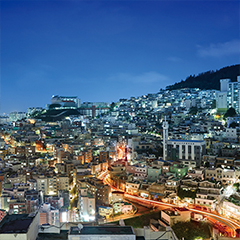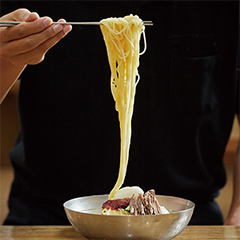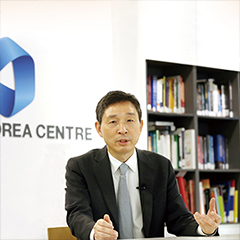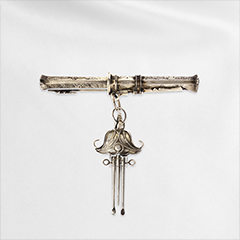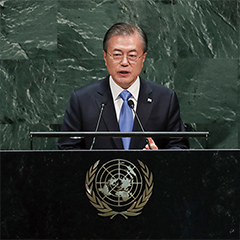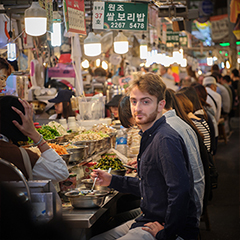Global Korea I
Command and Staff
College Marks
Korean Cultural Day
Egypt
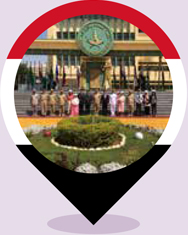
The Korean Cultural Center (KCC) in Cairo on Sept. 10 celebrated Korean Cultural Day at Egypt’s Command and Staff College, held in cooperation with Korean Air Force Lt. Col. Lee Gi-jong and Navy Lt. Commander Lee Dong-hyeon, who are both attending a training session at the college.
Around 400 people attended the event including military officers. Visitors had a variety of things to see including a Korean food event, traditional musical instruments and Hanbok.
Those attending the event showed high interest in the displays, seeing the unfamiliar musical Korean instruments brought to Egypt and looking closely at and touching replicas of Korean food. Many Egyptians also lined up to be photographed with event personnel dressed in Hanbok and praised the beauty of the traditional Korean attire.
The Korean food experience was also a hit, with glazed fried chicken bits, spicy rice cake and stir-fried glass noodles with vegetables prepared by the KCC to promote Korean culinary culture selling out quickly.
“Korea’s economic and cultural development is the best role model for Egypt,” said Tariq Ali, president of the college, adding that he hopes bilateral exchange and cooperation are strengthened in more areas.
City of Angeles
Hosts Traditional
Dance Show
Los Angeles
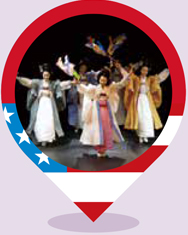
The KCC in Los Angeles held the Korean Traditional Dance and Cultural Heritage Festival for an audience of about 150 people including artists. The festival featured commentary by Korean Dance Commission of History President Min Hyang-suk during first-rate performances and diversity of programs.
Two types of the Pyeongyang Sword Dance, an intangible heritage of Korean dance, were featured alongside videos and narratives. The Mira Dance Company received big applause for its performance of traditional artist Lee Dong-an’s “Jinsoechum-Yeongsingeummu,” which included five female dancers, five-colored cords cascading from the kkwaenggwarichae (stick used to bang the gong-like instrument kkwaenggwari), one-legged hopping along to the beat of the kkwaenggwari and splendid dance waves. Bakjihongje Choehiseonryu’s “Dalgubeol Ip-chum” and “Kimjiripryu Ip-chum” by Kim Ji-rip, designated Korean Traditional Dance Master No. 3, were also well received. “Yedam Ip-chum,” the basic dance of the Lee Young Nam Dance Company, expressed the mind of a woman of grace and chastity, and other performances thrilled the audience.
A workshop was also held for ethnic Korean dancers in Los Angeles on their motherland’s traditional intangible culture, paving the way for the global spread of traditional Korean dance.
kevin
Global Korea II · Written by Korea.net Honorary Reporter Stephanie Pradnyaparamita from Indonesia Photo courtesy of Korea.net
Korean PR Roadshow in
West Java
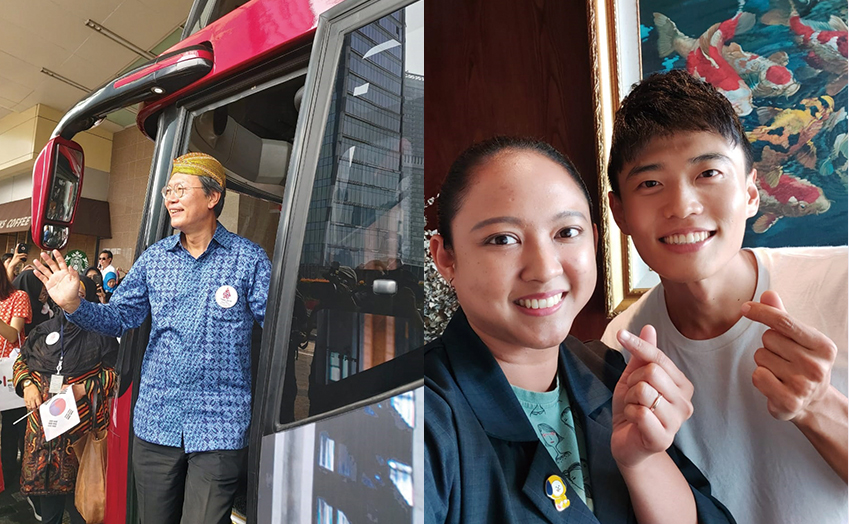
Korean Ambassador to Indonesia Kim Chang-beom waves goodbye before getting on a TeKo Nang Jawa bus.(left) / Stephanie Pradnyaparamita poses with noted Korean YouTuber Jang Hansol.(right)
The Korean Embassy in Indonesia from Sept. 2-7 ran the promotional project TeKo Nang Jawa, which literally means “Coming to Java” in Javanese. TeKo is an abbreviation for Teman Korea, which means “friends from Korea.” The Javanese are one of the largest tribes in Indonesia and the term usually refers to the natives of Java Island, especially Central and East Java. Through this project, Korean Ambassador to Jakarta Kim Chang-beom visited five cities in Java by bus. Covering approximately 1,000 km, he started his journey in the Indonesian capital and made stops in Cirebon, Brebes, Solo and Surabaya.The purpose of this project was to promote Korean culture not only in major Indonesian cities like Jakarta but also in smaller cities with many Hallyu fans but a dearth of Korean cultural events. I was surprised to hear about this project because traveling Indonesia by land is not easy, and this project was the first of its kind conducted by a foreign embassy in Jakarta. On Sept. 2, I attended the news conference and the kickoff eremony for the event in Jakarta. There, Kim mentioned that aside from Korean cultural events to be presented in each city, a food truck would hand out Korean street food such as tteokbokki (spicy rice cake) and eomuk (fishcake) to attendees. He also planned to eat food indigenous to each Indonesian city he visited.
The anchor of this project was the event Solo International Performing Arts 2019 from Sept. 5-7 in Solo, Central Java, featuring Korean cultural performances starting with samgomu (three-drum dance). Enthusiasm for this event was high as people who attended were not only from Solo but also from several nearby cities such as Magelang, Boyolali and even Jakarta. The industrial aspect of the city of Brebes was probably why Kim visited there. This city acts as a gateway between West and East Java, and many Korean companies are based there. Yet the Korean Embassy says the city’s exposure to Korean culture remains low. So Kim’s visit

